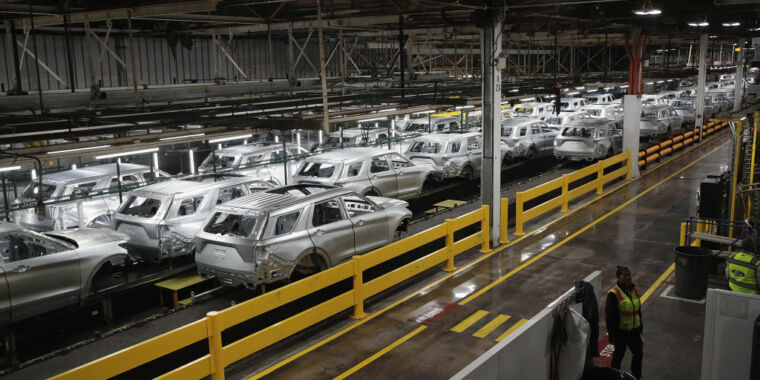
Scott Olson | Getty Images
The Biden government has pledged to take immediate action to address the global semiconductor shortages that forced the closure of several auto factories in the United States.
Jen Psaki, press secretary for the White House, said the government was “identifying potential bottlenecks in the supply chain” after being pressured by lawmakers, semiconductor companies and car manufacturers because of the shortage.
An increase in demand for consumer electronics during the pandemic led to a shortage of chips, which was exacerbated in the US by sanctions against SMIC, the Chinese chip maker.
This has hurt carmakers around the world as chipmakers have diverted supplies to consumer electronics customers, who pay more for semiconductors.
A White House official said the government is in “active talks” with foreign automakers, semiconductor groups and diplomats in an effort to resolve the problem.
President Joe Biden will sign an executive order demanding “a comprehensive review of essential goods supply chains” in the coming weeks, said Psaki.
She added: “The review will focus on identifying the immediate actions we can take, from improving the physical production of these items in the U.S. to working with allies to develop a coordinated response to the weaknesses and bottlenecks that are hurting American workers.”
General Motors and Ford paralyzed factories in response to a chip shortage. GM’s factories in Kansas, Canada and Mexico will halt vehicle production until mid-March, while Ford said it would run fewer shifts this week at two factories that make its best-selling F-150 pickup.
Both companies anticipate substantial impacts on their cash flow and earnings this year due to scarcity. GM said the deficit could cut earnings before interest and taxes by up to $ 2 billion; Ford said profit could decline by as much as $ 2.5 billion.
The automakers said they are working with suppliers to manage the shortage and are trying to allocate chips to more profitable vehicles whenever possible.
The impact on the auto industry attracted the attention of US lawmakers. Last week, 15 senators, including Chuck Schumer, the Senate majority leader, urged the White House to take action against the shortage, which they argued was threatening the US “post-pandemic economic recovery”.
Senators recommended that the White House guarantee the financing authorized by Congress last year under the CHIPS Act to boost national semiconductor manufacturing.
The crisis faced by automakers has also sparked requests for the replacement of semiconductor manufacturing in the United States for national security reasons.
On Thursday, chief executives of major semiconductor companies wrote to Biden to demand that financing for domestic semiconductor manufacturing be included in its infrastructure recovery plan.
The letter, which was signed by Intel’s chief executives, Qualcomm and GlobalFoundries, among others, noted the drop in the United States’ share of global chip manufacturing over the past three decades. Without further support, the letter warned, “the country’s technology leadership is at risk”.
© 2021 The Financial Times Ltd. All rights reserved It must not be redistributed, copied or modified in any way.
